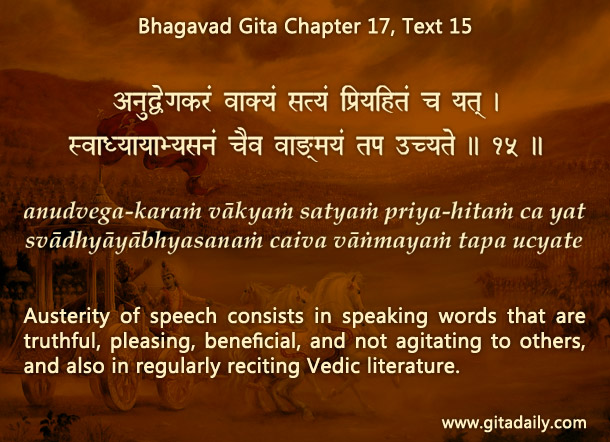When we grow in wisdom, we learn to live more consciously. We inspect our habitual actions and their consequences in an interconnected universe. By such conscious self-observation, we may realize that we are guilty of culinary violence through meat-eating. Once we understand that our food choices are causing immense pain, even death, to other living beings, we may naturally become vegetarian. All the more so when we discover that cruelty-free food can be both nutritious and delicious.
While some of us may need to become more conscious of what goes inside our mouth, others may need to become more conscious of what comes out of it. We may nonchalantly speak harsh words that can break hearts, rip families apart, end long-standing alliances, incite riots, even trigger wars.
Pertinently, Gita wisdom recommends regulation of both our eating and our speaking. Austerity of eating means to not eat impulsively, but be more principled in our dietary choices (Bhagavad-gita 17.08-10). Austerity of speaking means to not speak impulsively, but to carefully choose words that are both truthful and tactful so that they persuade rather than alienate (17.15).
Are we sometimes more conscious of culinary violence than verbal violence? Yes, because our culture may stress the consequences of culinary violence. Also, we may justify verbal violence: strong speaking is sometimes necessary to free people from their misconceptions. While that’s true, we may forget a critical truth: using strong words is like using firearms to protect people from criminals. While using firearms, we are extremely careful to target criminals, not general people. While using harsh words, are we similarly cautious in targeting misconceptions, not the holders of those misconceptions?
One-sentence summary:
Just as we regulate the food that goes into our mouth, regulate the words that come out of it too.
Think it over:
- How can the things coming out of our mouth have grave consequences?
- Why may we be more conscious of culinary violence than verbal violence?
- Have you ever realized the deadly power of verbal violence? How can you use that realization to minimize such violence?
***
17.15: Austerity of speech consists in speaking words that are truthful, pleasing, beneficial, and not agitating to others, and also in regularly reciting Vedic literature.
To know more about this verse, please click on the image
Explanation of article:
Podcast:


Thank you for this amazing insight.
Happy to be of service.